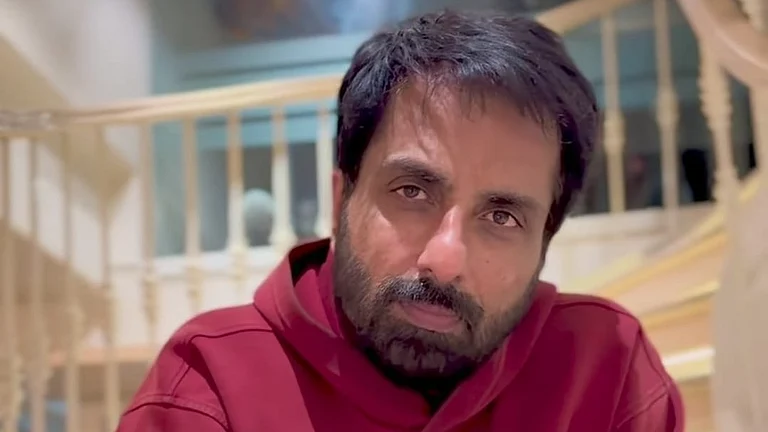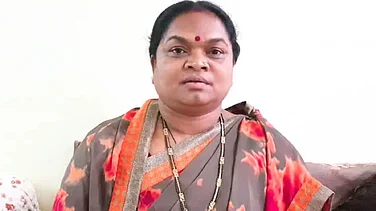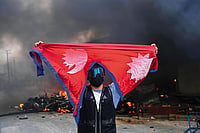The Supreme Court on Friday refused to stay the scientific survey at the Gyanvapi Mosque premises in Varanasi.
The Supreme Court directed the Archaeological Survey of India (ASI), which is conducting the survey, to use non-invasive methods.
The Apex Court's order came in the petition filed by the Gyanvapi mosque committee against the Allahabad High Court's order to allow the scientific survey by the ASI at the Gyanvapi Mosque premises. The committee argued in the SC that the survey is against the Places of Worship Act, 1991, which says that the character of religious places in the country would remain as it was on August 15, 1947, and cannot be changed.
The Allahabad High Court on Thursday upheld a Varanasi district court order and ruled that the proposed scientific survey is "necessary in the interest of justice" and will benefit both sides.
”In the opinion of the Court, the scientific survey/investigation proposed is necessary in the interest of justice and shall benefit the plaintiffs and defendants alike and come in aid of the trial court to arrive at a just decision. The (trial) court was justified in passing the impugned order,” the bench said in its 16-page verdict.
Within next few hours, the Gyanvapi mosque committee moved the Supreme Court against the judgement. The Bharatiya Janata Party (BJP) leaders welcomed the high court verdict, saying the "truth" about the temple at the site will now come out.
Survey against Places of Worship Act: Mosque Committee
The Gyanvapi mosque committee on Friday argued in the Supreme Court that the scientific survey at the mosque premises is against the Places of Worship Act, 1991, which says the character of religious places would remain as it was on August 15, 1947.
"No person shall convert any place of worship of any religious denomination or any section thereof into a place of worship of a different section of the same religious denomination or of a different religious denomination or any section thereof," says Section 3 of the Places of Worship Act, 1991.
The mosque committee said in the Supreme Court that the "digging" by the ASI "impinges upon fraternity, secularism", reported PTI.
"ASI survey intends to go into history as to what happened 500 years ago, it will reopen wounds of past," said the mosque panel to SC, as per SC.
The mosque committee also said that the petition for the survey, filed by the Hindu devotees, is "frivolous".
"If someone now comes and files a frivolous plea saying that there is a monument below this structure... will you order an ASI survey," said the committee, as per PTI.
The Supreme Court allows ASI's 'non-invasive' survey
The Supreme Court disposed the Gyanvapi mosque petition and allowed a survey by the ASI through "non-invasive" techniques.
The Supreme Court also rejected the mosque committee's assertion that the petition was "frivolous".
"What is frivolous to you is faith to the other side. [For the Hindu side] It is ‘shivling, and you say it is a fountain," said the Supreme Court, as per PTI.
The Supreme Court said it is clarified on the affidavit on behalf of the ASI that as a matter of fact, the entire survey will be completed without any excavation at the site and without causing any destruction to the structure, reported PTI.
"We also order and direct that the entire process shall be concluded by a non-invasive methodology that may be adopted by the ASI. We reiterate the direction that there should be no excavation at the site in accordance with the statement which was made before the High Court by the ASI and which has been reiterated in the submissions made by the solicitor general before this court on behalf of the ASI," said the Supreme Court, as per PTI.
The SC further said that the ASI's survey report will be submitted to the trial court and the decision on that will be taken by the district judge.
ASI concludes survey for the day
Even as the Supreme Court heard the challenge of the Gyanvapi mosque committee, the ASI was conducting the survey at the Gyanvapi mosque premises. The survey began after the Allahabad High Court's order on Thursday.
Following the High Court order, a team of ASI on Friday arrived at the Gyanvapi mosque premises for the survey.
The ASI's survey concluded in the evening. Visuals surfaced from the site showing ASI personnel.
Varanasi District Magistrate S Rajalingam said on Thursday the ASI has sought assistance from the local administration to start the survey from Friday. He said detailed discussions were held with the Varanasi Police Commissioner on security during the survey and that the district administration is fully prepared to start the work.
All about the ASI survey
On July 21, a Varanasi court directed the ASI o conduct a survey to determine if the mosque was built at a place where a temple existed earlier. The court's direction also included excavations, wherever necessary. The ASI had started the survey On July 24.
However, after the mosque committee approached the Supreme Court, the process was halted within hours, allowing time for the committee to appeal against the lower court's order.
While approaching the Apex Court, the counsel for the mosque committee had expressed concerns over possible damages to the structure that the survey and excavation would cause.
About the Gyanvapi Mosque case
The Gyanvapi mosque case came to prominence after five Hindu devotees filed a plea in a Varanasi court in August 2021 for rights to pray daily before Hindu idols on the outer walls of Gyanvapi mosque.
Addressing the issue, the court ordered a video survey of the complex based on this petition in 2022.
An extensive survey led to the discovery of a structure which the petitioners claimed was a 'shivling' while, on the contrary, the mosque management committee claimed the structure was part of a fountain in the 'wazukhana'.
Considering the sensitivity of the case, the Supreme Court ordered the sealing of the purported 'shivling' area.
In September 2022, the Varanasi District Court dismissed a challenge by the mosque committee, which argued that the women's request to worship Hindu deities inside the complex premises was not maintainable.





















